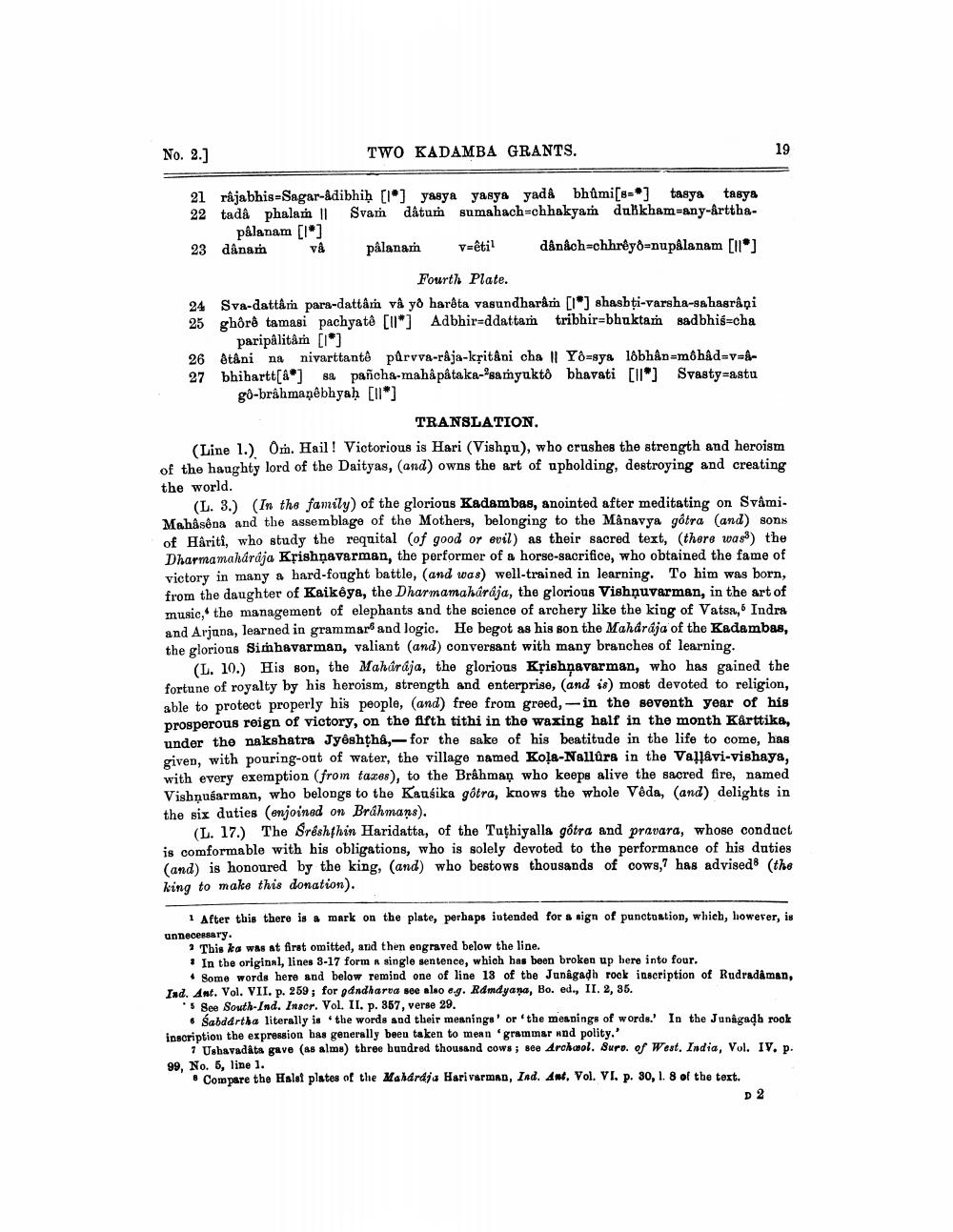________________
No. 2.)
TWO KADAMBA GRANTS.
21 râjabhis-Sagar-Adibhiḥ [lo] yasya yasya yada bhůmi[-] tasya tasya 22 tada phalam 11 Svam datum sumahach-chhakyan dukkham-any-årttha
pâlanam [lo] 23 dânam và pâlanan v-êti dânâch=chhreyð-nupalanam [ilo]
Fourth Plate. 24 Sva-dattár para-dattár vi yð harðta vasundharam [] shashţi-varsha-sahasrapi 25 ghôrê tamasi pachyatê [ll] Adbhir-ddattam tribhirubhuktam sadbhis-cha
paripálitârn [18] 26 êtâni na nivarttantê parvva-raja-ksitâni cha || Yô=sya lobhán=môhâd=v=A27 bhihartt[a] sa pancha-mahåpåtaka-samyuktô bhavati [ll] Svasty=astu gô-brahman@bhyah [i*]
TRANSLATION. (Line 1.) Om. Hail! Victorious is Hari (Vishņu), who crushes the strength and heroism of the haughty lord of the Daityas, (and) owns the art of upholding, destroying and creating the world.
(L. 3.) (In the family of the glorious Kadambas, anointed after meditating on Svami. Mahasena and the assemblage of the Mothers, belonging to the Mânavya gôtra (and) sons of Hâriti, who study the requital (of good or evil) as their sacred text, there was the Dharmamaharaja Krishnavarman, the performer of a horse-sacrifice, who obtained the fame of victory in many a hard-fought battle, (and was) well-trained in learning. To him was born, from the daughter of Kaikêya, the Dharmamahúrája, the glorious Vishnuvarman, in the art of music, the management of elephants and the science of archery like the king of Vatsa Indra and Arjana, learned in grammar and logic. He begot as his son the Maharaja of the Kadambas, the glorious Simhavarman, valiant (and) conversant with many branches of learning.
(L. 10.) His son, the Maharaja, the glorious Krishnavarman, who has gained the fortune of royalty by his heroism, strength and enterprise, (and is) most devoted to religion, able to protect properly his people, (and) free from greed, in the seventh year of his prosperous reign of victory, on the fifth tithi in the waxing half in the month Karttika, under the nakshatra Jyêshthâ,- for the sake of his beatitude in the life to come, has given, with pouring-out of water, the village named Koļa-Nallûrs in the Vallávi-vishaya, with every exemption (from taxes), to the Brahman who keeps alive the sacred fire, named Vishnu arman, who belongs to the Kausika gôtra, knows the whole Veda, (and) delights in the six duties (enjoined on Brahmans).
(L. 17.) The Sreshthin Haridatta, of the Tuthiyalla gôtra and pravara, whose conduct is comformable with his obligations, who is solely devoted to the performance of his duties (and) is honoured by the king, (and) who bestows thousands of cows,7 has advised (the king to make this donation).
1 After this there is a mark on the plate, perhaps iutended for a sign of punctuation, which, however, is unnecessary
1 This ka was at first omitted, and then engraved below the line. • In the original, lines 3-17 form a single sentence, which has been broken up bere into four.
• Some words here and below remind one of line 13 of the Junagadh rock inscription of Rudradaman, Ind. Ant. Vol. VII. p. 259; for pandharva see alao eg. Rdmdyana, Bo. ed., II. 2, 85.
See South-Ind. Inscr. Vol. II. p. 357, verse 29.
. Sabdartha literally in the words and their meanings' or 'the meanings of words. In the Junagadh rook inscription the expression bas generally been taken to mean grammar and polity,'
Ushavadáta gave (as alms) three bundred thousand cows; 860 Archaol. Suro. Of West. India, Vol. IV. p. 99, No. 5, line 1. . Compare the Halot plates of the Malandja Harivarman, Ind. Ant. Vol. VI. p. 30, 1. 8 of the text.
D 2




